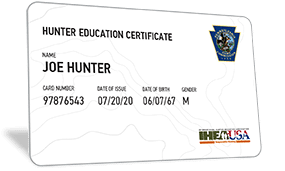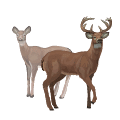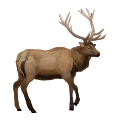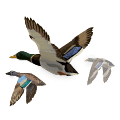
AGE REQUIREMENTS FOR PENNSYLVANIA HUNTERS
Every hunter in Pennsylvania, regardless of age, is required to complete Hunter Education Certification. Hunters must be at least 11 years of age in order to complete an online course.

PENNSYLVANIA HUNTING EDUCATION REQUIREMENTS
WHAT IS A PENNSYLVANIA HUNTER EDUCATION CERTIFICATE
A Pennsylvania Hunter Education Certificate proves that you’ve obtained the knowledge needed to hunt safely, responsibly, and ethically, within the state of Pennsylvania. All hunters in Pennsylvania are required to get certified. Regardless of age.
WHERE CAN I GET MY PENNSYLVANIA HUNTER EDUCATION CERTIFICATE?
You can obtain your Pennsylvania Hunter Education Card by completing a Pennsylvania Game Commission approved course. Courses can be taken either online or in-person, depending on your preference.
In-Person (Classroom) Course Option
6-Hour Classroom Course:
Students can register to complete a 6-hour classroom course, which requires some independent study prior to the course.
8-Hour Classroom Course:
The 8-hour course is completed in-person and does not require any independent study in advance.
Online Course:
Hunters can obtain their Hunter Education Course entirely online if they choose. Online courses typically take about 4-6 hours to complete. Students are issued a Temporary Hunter Education Certificate upon completion.
The Pennsylvania Game Commission also offers a free downloadable study guide, for students who want to prep for the course beforehand.
HOW OLD DO I HAVE TO BE TO GET A HUNTER EDUCATION CERTIFICATE IN PENNSYLVANIA?
You must be 11 years of age or older to complete a hunter education course in Pennsylvania, and obtain a Hunter Education Certificate.
MENTORED HUNTING PROGRAMS
Mentored youth and adult hunting programs are available to youths who are less than 16 years of age, and adults who have not obtained a Hunter Education Certificate. Hunters interested in mentored hunts must obtain the appropriate mentored hunting permit for their age group.
The permit allows the hunter to participate in hunting, without a hunter education certificate, as long as they are supervised by a certified hunter. The supervising person or “mentor” must be 21 years of age or older, possess the appropriate licenses and permits for their hunt, and be certified by a state-approved Hunter Education Course.
Is my Pennsylvania Hunter Education Certificate valid in other states?
The Pennsylvania Hunter Education Certificate will be accepted in any US state, province, or country which also requires mandatory hunter education, meaning hunters who have obtained their Pennsylvania Hunter Education Certificate may use it to hunt in other states. This is known as “reciprocity”.
What's the difference between a Hunter Education Certificate and a Hunting License?
A Hunter Education Card proves that you’ve obtained the knowledge you need to hunt safely and ethically in Pennsylvania, and is different from a Hunting License. The Hunting Licence is similar to a permit, and is required to hunt any game animal within the state. Different licenses and permits may be required depending on which game animal is being hunted.

HUNTING LICENSES, STAMPS AND PERMITS
HUNTING LICENSES
A Hunting License is required in the state of Pennsylvania to hunt any game animal. There are a variety of license types available depending on your age, residency status, and what type of game you plan to hunt. Some of the hunting license types in Pennsylvania include:
Resident Adult Hunting License
Issued to residents of Pennsylvania who are aged 17-64. This license type includes one antlered-deer tag and one spring turkey tag as well as small game hunting privileges. The license is valid for one license year.
Resident Junior Hunting License
This license type is issued to Pennsylvania residents who are 12-16 years of age, who have successfully completed a Hunter Education Course. The license must be signed by the applicant, in addition to a parent or guardian. The license includes one antlered deer tag, a fall turkey tag and one spring turkey tag as well as small hunting game privileges. The license does not permit for archery, muzzleloader or furtaker add-on privileges – these privileges are available with the Resident Junior Combination License. Applicants who are 11 years of age may also apply for the license if they will be 12 years of age by June 30th of the license year.
Resident Senior Hunting License
This license type is available to residents of Pennsylvania who are 65 years of age or older. Hunters who are 64 years of age may apply for the license so long as they will be 65 years of age by June 30th of the incense year. The license includes one antlered deer tag, one fall turkey tag, and a spring turkey tag and includes small game hunting privileges for one license year.
Add-on Licenses
Add on license types must be purchased in addition to regular hunting licenses in order to hunt specific game animals, or with a particular firearm. License types include bear licenses, archery licenses, and migratory game licenses among others. Hunters should be familiar with and possess the correct licenses required for the game animal they’ll be hunting or the type of firearm being used.
PENNSYLVANIA HUNTER CERTIFICATION AGE REQUIREMENTS

UNDER 11 YEARS OF AGE
You must be 11 years of age or older to complete a hunter education course in Pennsylvania, and obtain a Hunter Education Certificate.

11 Years of age or older
Hunters who are 11 years of age or older, and who were born on or after January 1st, 1969 are required to obtain a Hunter Education Certificate in order to hunt within the state of Pennsylvania.

Pennsylvania's Hunting Fines

Failure to carry Hunter Education Certificate (16 years of age or older)
Up to $500

Hunting without a License
Up to $500

Unlawful taking of wildlife (depending on game animal)
Up to $1,500

Taking threatened or endangered species
Up to $5,000

Trespassing on private property
Up to $200
PENNSYLVANIA HUNTING FAQS
DO I NEED A HUNTING LICENSE TO HUNT WITHIN THE STATE OF PENNSYLVANIA?
Yes. A Hunting License is different from a Hunter Education Certificate and is required for any person who hunts any game animal within the state. This includes both residents and non-residents. Varying licenses must be purchased and carried depending on the hunter’s age, residency, and the type of game being hunted. Certain exceptions may apply depending on the game animal being hunted. For more information on Pennsylvania, hunting licenses visit the Pennsylvania Game Commission Licenses and Permits page.
WHAT ARE THE PENNSYLVANIA TAGGING REQUIREMENTS?
Certain game animals must be tagged after they’re taken, including big game animals such as deer, elk, bear, and turkey. It’s important for hunters to understand the tagging and/or harvest reporting requirements for the game animal they’re hunting, and to ensure that the animal is tagged and reported properly.
Tagging Requirements
Once you’ve successfully taken your big game animal, it must be tagged. Hunters should note that only the tag should be attached to the animal, not the license. Hunters who have more than one license for the game animal they’ve taken must ensure that they’re reporting the information on the license that was used (the license will come attached to the tag).
Tags will come with an icon of the animal it’s meant to be used for, in addition to pre-punched holes which should be used to attach the tag to the animal. Use a ballpoint pen to fill out the tag, and then attach it to the animal.
Once the animal has been tagged, it must be reported to the Pennsylvania Game Commission. The harvest can be reported online on the Pennsylvania Game Commission website.
WHAT ARE THE HUNTER ORANGE REQUIREMENTS IN PENNSYLVANIA?
Hunters in Pennsylvania must wear at least 250 square inches of hunter orange (also called “Blaze” or “fluorescent” orange) material on their head, chest, and back combined. The hunter orange must be worn during all fall small game, turkey, bear seasons, during the regular firearms deer season and any season that coincides with the general small game or turkey seasons.
Additionally, a minimum of 100 square inches of hunter orange must be worn on the head, back, or chest during the spring Turkey seasons when moving from one location to another. Groundhog hunters are also required to wear a minimum of 100 square inches of hunter orange on the head.
The hunter orange must be visible in a 360 degree arc.
WHAT ARE THE BAG LIMITS IN PENNSYLVANIA?
Bag limits are imposed on hunters to restrict the number of a particular game animal that can be taken. Bag limits may be daily or seasonal depending on the type of animal. For example, in Pennsylvania daily bag limits are imposed for ruffed grouse (2 per day). Seasonal bag limits restrict the number of a particular game animal that may be taken by a hunter within the hunting season.
Bag limits may vary annually depending on game species populations. Hunters must understand and follow bag limit restrictions. Violations may result in fines. For more information on bag limits visit the Pennsylvania Game Commission website.

GAME AND NON-GAME SPECIES
GAME SPECIES
Pennsylvania offers a wide variety of game species for all types of hunters. The state boasts mountainous landscape and rolling hills and valleys – In addition, 50% of the state’s lands are still forested, offering a wide range of habitats and ecosystems for wildlife, including game species.
Game species in Pennsylvania are categorized as follows:
- Big game including white-tailed deer, black bear, elk and turkey.
- Small game including woodcock, pheasant, ruffed grouse and quail, among others.
- Waterfowl and other migratory game birds including ducks, geese, and mourning dove.
- Furbearers including beaver, bobcat, fisher, fox, coyote among others.
NON-GAME SPECIES
Nongame species within the state makeup 75% of the state’s wildlife and include mammals, birds, fish, reptiles, amphibians, and invertebrates which typically may not be hunted, are considered a nuisance or are protected, endangered, or at risk. There is, unfortunately, a lengthy list of endangered, protected, and threatened species within the state. For more information on nongame, and endangered species within the state visit the Pennsylvania Game Commission Wildlife page.
INVASIVE SPECIES
Invasive animals and other pests have been introduced to the United States, including the State or Pennsylvania, and have become a threat to native wildlife. These animals, plants, fish, and invertebrates typically have no natural predators which can result in rapid spread and population growth. This in turn can seriously harm the state’s lands and waters, and can be detrimental to the health and population numbers of a variety of the state’s native plants and animals. Some common invasive species in Pennsylvania include Asian Tiger Mosquito, Zebra Mussel, Brown Marmorated Stinkbug, and the Japanese Beetle, as well as the Feral Hog – one of the most destructive and notable of the state’s pests.
In order to protect Pennsylvania’s native plants and animals, invasive species must be controlled and eradicated. Anyone who encounters or suspects that they have encountered an invasive species within the state is encouraged to report the sighting so that it can be monitored and controlled. For information on how to report various types of invasive species in Pennsylvania visit the US Department of Agriculture, National Invasive Species Information Center.

PENNSYLVANIA HUNTING SEASONS
Hunting seasons and dates may change annually per game animal, depending on a variety of factors. Season dates are further broken out, region or Wildlife Management Units (WMUs). Additionally, seasons are often categorized by firearm time, including archery, firearms, and muzzleloader or “primitive” firearms seasons.

White-tailed Deer
Deer seasons in Pennsylvania are broken down by firearm type and by Wildlife Management Unit (WMU). Seasons dates vary depending on the WMU and the type of firearm being used. The season typically begins in September, depending on the WMU and firearm type, and ends in mid-December. Seasons include firearms, special firearms and muzzleloader seasons, and are organized by antlerless and antlered deer.

Bear
Bear seasons are organized by type of firearm, and by WMU, although muzzleloader and special firearms seasons are statewide. Bear season typically begins in Mid September, and runs through to late November or mid December, depending on the WMU.
Learn more about hunting bear in Pennsylvania.

Elk
Elk seasons in Pennsylvania are not organized by WMU. Seasons include Archery seasons, antlered and antlerless seasons, and a late season. They’re slightly shorter with seasons being 1 or 2 weeks in length, in either September, November or January.

Small Game
There are several small game animals to hunt in the State including squirrels, ruffed grouse, rabbits, pheasant, bobwhite quail, hare, groundhogs, crows, starlings and sparrows. Seasons dates for small game types vary depending on the game animal type. Most seasons begin in October and continue until January or February, although squirrel season begins in September.

DUCK
Duck seasons are organized by zone, as opposed to WMUs. There are four zones including north, south, northwest and Lake Erie zones. Each zone has varying restrictions, hunting hours, and bag limits. Bag limits and seasons fates may also vary depending on the species of duke being hunted. The season typically opens in October or November and ends in late January or early December.
HUNTING ON PUBLIC OR PRIVATE LAND
PRIVATE LAND
Much of the land in Pennsylvania is privately owned. Hunters can typically freely take game animals hunted on their own private property, or may seek permission from a landowner to hunt on private property. Hunters who wish to take game on privately owned land must follow state hunting regulations as well as any regulations specified by the landowner. Hunters must ensure they respect the rights and property of the landowner at all times.
PENNSYLVANIA HUNTER ACCESS PROGRAM
The Pennsylvania Game Commission has partnered with private landowners to provide additional hunting opportunities and land access throughout the state, under the Hunter Access Program. The Program has existed for more than 80 years to provide access to millions of acres of private lands. For more information on how to use private lands through the Hunter Access program, or to participate in the program as a landowner, visit the Pennsylvania Game Commission Hunter Access Program webpage.
PUBLIC LAND
Nearly 1.5 million acres of game lands throughout the state are owned and managed by the Pennsylvania Game Commision. The purpose of the state owned land is to provide management of wildlife and habitat, and to provide hunting and trapping opportunities for hunters.
State managed lands have species rules and regulations in place that must be followed by all land users. State lands may also be used for other recreational purposes including horseback riding, snowmobiling, and bicycling.
For more information on the rules and regulations that apply to hunter and other recreational users of state lands, visit the Pennsylvania Game Commision website, or review the Pennsylvania Code State Game Lands Chapter.
SPECIAL REGULATIONS AREAS
Certain counties and regions within the State of Pennsylvania are considered to be Special Regulations Areas – additional rules and regulations may apply within these regions. Hunters must ensure that they are familiar with and follow these regulations if they are hunting within a Special Regulations Area. Special Regulations Areas within the state include:
- Allegheny County (western Pennsylvania)
- Bucks, Chester, Delaware, Montgomery, and Philadelphia counties in southeastern Pennsylvania
- Ridley Creek and Tyler State Parks during special controlled hunts.
Additional regulations within these areas may include firearm types restrictions (ex. Centrefire rifles may not be permitted), baiting restrictions, shotgun gauge restrictions, as well as minimum caliber requirements for rifles when used on certain game animal types.
State Parks & Forests
Hunting in Pennsylvania’s State Parks & Forests
All of Pennsylvania’s 20 state forests are open to public hunting, providing hunters with 2.2 million acres of accessible lands. Additionally, 97 state parks are also open to hunters during established hunting seasons. Hunters who are accessing these properties to take game must understand and follow the rules and regulations that apply in these areas.
State Forest Regulations
The following activities are prohibited within Pennsylvania’s State Forests:
- Operating an ATV in an area that has not been posted as open for off-road vehicles
- Cutting, picking, damaging or removing any plant life such as vines, trees, flower or shrubs
- Littering
- Releasing any animal that was brought into a state forest
State Parks Regulations
The following activities are prohibited in Pennsylvania’s State Parks:
- Pursuing or intentionally disturbing wildlife, unless the person is engaged in legal hunting activities
- Hunting with any firearm within a state park without a hunting license
- Possession of an uncased firearm unless engaged in hunting activities
The Keystone State. Ready and rarin’ to go.

Where to Hunt in Pennsylvania
There are plenty of game animals for hunting in Pennsylvania, in addition to millions of acres on which to hunt them. Deer, turkey, and bear hunters will find no shortage of hunting opportunities – bear hunters in particular should focus their attention on the northern and north central regions of the state including Lycoming County, and Luzerne county.
Lycoming County also borders Susquehannock State Forest, which boasts 265,000 acres of land with plenty of bear, deer, turkey and grouse hunting opportunities. The state also offers plenty of white-tailed deer hunting opportunities. Top spots include Laurel Ridge State Parks, located on the south-east side of Westmoreland County, Racoon Creek State Park, and Beaver County.
The state also offers plenty of upland game hunting opportunities including prime locations for quail and pheasant. There are also dozens of guided tours for a variety of game animals including bear, white-tailed deer, and boar.